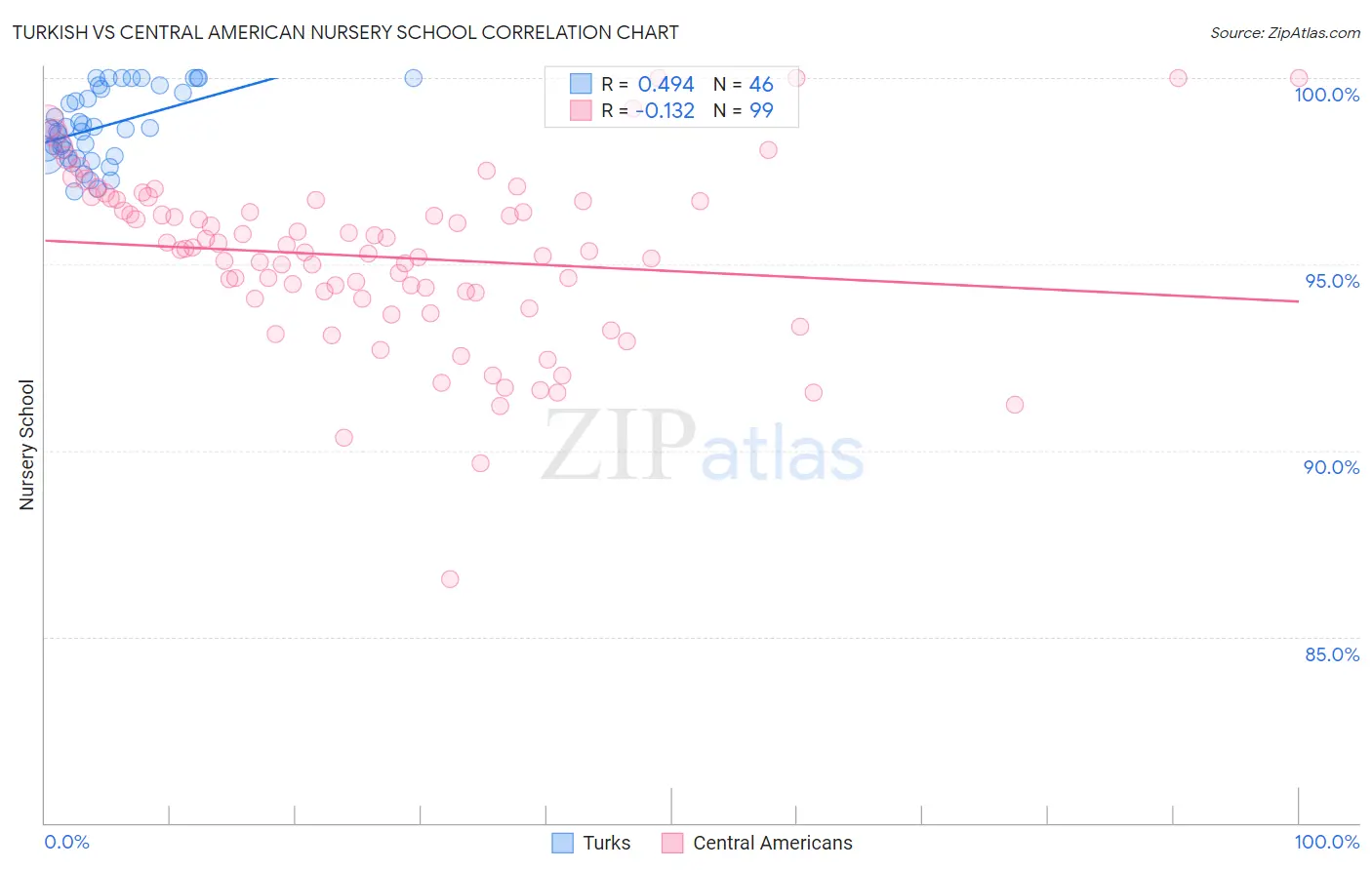Turkish vs Central American Nursery School
COMPARE
Turkish
Central American
Nursery School
Nursery School Comparison
Turks
Central Americans
98.2%
NURSERY SCHOOL
97.4/ 100
METRIC RATING
105th/ 347
METRIC RANK
96.6%
NURSERY SCHOOL
0.0/ 100
METRIC RATING
333rd/ 347
METRIC RANK
Turkish vs Central American Nursery School Correlation Chart
The statistical analysis conducted on geographies consisting of 271,858,657 people shows a moderate positive correlation between the proportion of Turks and percentage of population with at least nursery school education in the United States with a correlation coefficient (R) of 0.494 and weighted average of 98.2%. Similarly, the statistical analysis conducted on geographies consisting of 504,619,275 people shows a poor negative correlation between the proportion of Central Americans and percentage of population with at least nursery school education in the United States with a correlation coefficient (R) of -0.132 and weighted average of 96.6%, a difference of 1.7%.

Nursery School Correlation Summary
| Measurement | Turkish | Central American |
| Minimum | 97.0% | 86.5% |
| Maximum | 100.0% | 100.0% |
| Range | 3.0% | 13.5% |
| Mean | 98.7% | 95.2% |
| Median | 98.6% | 95.4% |
| Interquartile 25% (IQ1) | 97.9% | 94.1% |
| Interquartile 75% (IQ3) | 99.7% | 96.7% |
| Interquartile Range (IQR) | 1.8% | 2.6% |
| Standard Deviation (Sample) | 0.95% | 2.3% |
| Standard Deviation (Population) | 0.94% | 2.3% |
Similar Demographics by Nursery School
Demographics Similar to Turks by Nursery School
In terms of nursery school, the demographic groups most similar to Turks are Bhutanese (98.2%, a difference of 0.0%), Immigrants from Switzerland (98.2%, a difference of 0.0%), Basque (98.2%, a difference of 0.0%), Immigrants from Ireland (98.3%, a difference of 0.010%), and Cree (98.3%, a difference of 0.010%).
| Demographics | Rating | Rank | Nursery School |
| Choctaw | 98.3 /100 | #98 | Exceptional 98.3% |
| Colville | 98.2 /100 | #99 | Exceptional 98.3% |
| Puget Sound Salish | 98.0 /100 | #100 | Exceptional 98.3% |
| Romanians | 97.9 /100 | #101 | Exceptional 98.3% |
| Immigrants | Ireland | 97.7 /100 | #102 | Exceptional 98.3% |
| Cree | 97.7 /100 | #103 | Exceptional 98.3% |
| Bhutanese | 97.4 /100 | #104 | Exceptional 98.2% |
| Turks | 97.4 /100 | #105 | Exceptional 98.2% |
| Immigrants | Switzerland | 97.3 /100 | #106 | Exceptional 98.2% |
| Basques | 97.3 /100 | #107 | Exceptional 98.2% |
| Pima | 97.1 /100 | #108 | Exceptional 98.2% |
| German Russians | 97.1 /100 | #109 | Exceptional 98.2% |
| Immigrants | Singapore | 96.9 /100 | #110 | Exceptional 98.2% |
| Immigrants | Czechoslovakia | 96.8 /100 | #111 | Exceptional 98.2% |
| Immigrants | Norway | 96.6 /100 | #112 | Exceptional 98.2% |
Demographics Similar to Central Americans by Nursery School
In terms of nursery school, the demographic groups most similar to Central Americans are Immigrants from Dominican Republic (96.6%, a difference of 0.010%), Yakama (96.6%, a difference of 0.020%), Immigrants from Armenia (96.7%, a difference of 0.030%), Bangladeshi (96.6%, a difference of 0.040%), and Immigrants from Vietnam (96.7%, a difference of 0.060%).
| Demographics | Rating | Rank | Nursery School |
| Indonesians | 0.0 /100 | #326 | Tragic 96.8% |
| Mexicans | 0.0 /100 | #327 | Tragic 96.8% |
| Immigrants | Latin America | 0.0 /100 | #328 | Tragic 96.7% |
| Immigrants | Vietnam | 0.0 /100 | #329 | Tragic 96.7% |
| Japanese | 0.0 /100 | #330 | Tragic 96.7% |
| Immigrants | Armenia | 0.0 /100 | #331 | Tragic 96.7% |
| Yakama | 0.0 /100 | #332 | Tragic 96.6% |
| Central Americans | 0.0 /100 | #333 | Tragic 96.6% |
| Immigrants | Dominican Republic | 0.0 /100 | #334 | Tragic 96.6% |
| Bangladeshis | 0.0 /100 | #335 | Tragic 96.6% |
| Guatemalans | 0.0 /100 | #336 | Tragic 96.6% |
| Immigrants | Cambodia | 0.0 /100 | #337 | Tragic 96.5% |
| Immigrants | Fiji | 0.0 /100 | #338 | Tragic 96.5% |
| Immigrants | Guatemala | 0.0 /100 | #339 | Tragic 96.4% |
| Immigrants | Central America | 0.0 /100 | #340 | Tragic 96.4% |